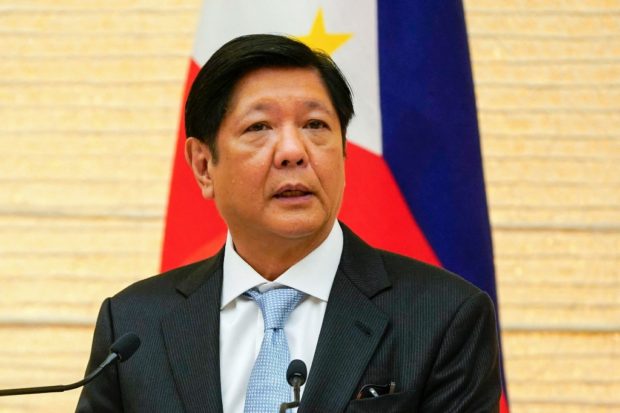
Philippine President Ferdinand Marcos speaks during a press conference with Japanese Prime Minister Fumio Kishida at the prime minister’s official residence in Tokyo on February 9, 2023. (Photo by Kimimasa MAYAMA / POOL / AFP)
MANILA, Philippines – The Philippines “has to take measures to protect itself” because a conflict in Taiwan, with its “physical proximity,” would affect it immediately.
President Ferdinand Marcos Jr. Marcos made the statement in an interview with Japanese broadcaster NHK during his visit to Tokyo.
Tensions have continued to mount between China and Taiwan, a potential flashpoint near the Philippines’ sea border in the north. Beijing calls Taipei a breakaway province and regards it as part of its territory, to be reclaimed one day, by force if necessary.
“We do consider ourselves very much in the front line… If there is conflict and an outright force being used, or there’s actual fighting going on, it seems impossible to me that the Philippines will not be involved in one way or another,” Marcos said.
“You will certainly not go to war with anyone. But we will, somehow, because of our physical proximity to whatever could be happening. We see that the Philippines has to take measures to protect itself,” he said.
‘National interest’
The president also emphasized that the country would continue to pursue an independent foreign policy.
“It is not guided by any other country, but guided by the national interest [as to] what is best for the Philippines,” he said.
During his five-day visit to Tokyo, the Philippines, and Japan agreed to step up defense ties amid China’s actions in the South China Sea and concerns that it may soon attack Taiwan.
Both Manila and Tokyo are also exploring a possible visiting forces agreement that will pave the way for Japanese troops to conduct large-scale military exercises in the country.
The “terms of reference” on humanitarian and disaster relief cooperation signed during Marcos’ visit will be a “stepping stone” to such an agreement, according to officials from both sides.
Japan has been joining military drills between the Philippines and the United States in Manila as an observer while also conducting small-scale bilateral exercises on disaster response.
Japanese Prime Minister Fumio Kishida said his country and the Philippines would study defense equipment and technology cooperation.
‘Strategic areas’
Marcos has sought closer ties with the United States and its allies like Japan amid the regional security developments — reversing his predecessor Rodrigo Duterte’s pivot to China.
Early this month, he granted the US access to four more military bases under the 2014 Enhanced Defense Cooperation Agreement, allowing American forces to preposition personnel, equipment, and supplies at selected Philippine bases to quickly respond during natural disasters and other crises.
While the locations of these “strategic areas” have yet to be officially announced, two of these are believed to be in the northern part of the country facing Taiwan.